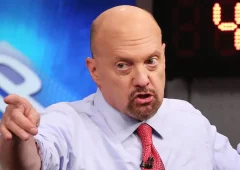U.S. Dollar Maintains Dominance as Indian Rupee Hits Historic Low
10.12.2024 20:30 2 min. read Kosta Gushterov
The U.S. dollar’s strength in the global financial landscape remains unshaken, as it continues to outperform other currencies, including the Indian rupee.
Recently, the DXY index, which monitors the performance of the dollar against a basket of currencies, has surpassed the 106 mark, reinforcing the dollar’s dominance. This ongoing strength has been making local currencies falter, with many suffering significant losses.
On Tuesday, the Indian rupee hit a historic low of 84.87 against the U.S. dollar, marking a new milestone in its downward trajectory. The rupee has been under pressure for months, especially since November, as the dollar and other U.S. assets, such as stocks and cryptocurrency, surged, benefiting from renewed optimism surrounding President Trump’s economic policies.
As Trump prepares for another term, market participants are hopeful that his policies will steer the U.S. economy toward further growth. However, this optimism could come at the expense of other currencies, particularly the Indian rupee, which may struggle to regain strength. The rupee’s ongoing decline could see it dip even further, potentially breaking the 85 mark before the end of January 2025.
The pressure on the rupee is compounded by the significant outflows from foreign institutional investors, who have recently sold off nearly $12 billion worth of Indian equities. This has added further strain to the already weak currency. Now, it’s up to Shaktikanta Das, the Governor of the Reserve Bank of India, to determine how to respond to this crisis. His decisions in the coming months will be critical in shaping the rupee’s future, especially in the face of the U.S. dollar’s ongoing dominance.
For now, unless the RBI introduces new measures to support the rupee, it’s likely that the dollar will continue its reign, leaving other currencies, including the rupee, vulnerable to further declines.
-
1
U.S. PCE Inflation Rises for First Time Since February, Fed Rate Cut Likely Delayed
27.06.2025 18:00 1 min. read -
2
Key U.S. Economic Events to Watch Next Week
06.07.2025 19:00 2 min. read -
3
Gold Beats U.S. Stock Market Over 25 Years, Even With Dividends Included
13.07.2025 15:00 1 min. read -
4
U.S. Announces Sweeping New Tariffs on 30+ Countries
12.07.2025 16:30 2 min. read -
5
US Inflation Heats Up in June, Fueling Uncertainty Around Fed Cuts
15.07.2025 16:15 2 min. read
US Inflation Heats Up in June, Fueling Uncertainty Around Fed Cuts
U.S. inflation accelerated in June, dealing a potential setback to expectations of imminent Federal Reserve rate cuts.
Gold Beats U.S. Stock Market Over 25 Years, Even With Dividends Included
In a surprising long-term performance shift, gold has officially outpaced the U.S. stock market over the past 25 years—dividends included.
U.S. Announces Sweeping New Tariffs on 30+ Countries
The United States has rolled out a broad set of new import tariffs this week, targeting over 30 countries and economic blocs in a sharp escalation of its trade protection measures, according to list from WatcherGuru.
Key U.S. Economic Events to Watch Next Week
After a week of record-setting gains in U.S. markets, investors are shifting focus to a quieter yet crucial stretch of macroeconomic developments.
-
1
U.S. PCE Inflation Rises for First Time Since February, Fed Rate Cut Likely Delayed
27.06.2025 18:00 1 min. read -
2
Key U.S. Economic Events to Watch Next Week
06.07.2025 19:00 2 min. read -
3
Gold Beats U.S. Stock Market Over 25 Years, Even With Dividends Included
13.07.2025 15:00 1 min. read -
4
U.S. Announces Sweeping New Tariffs on 30+ Countries
12.07.2025 16:30 2 min. read -
5
US Inflation Heats Up in June, Fueling Uncertainty Around Fed Cuts
15.07.2025 16:15 2 min. read


